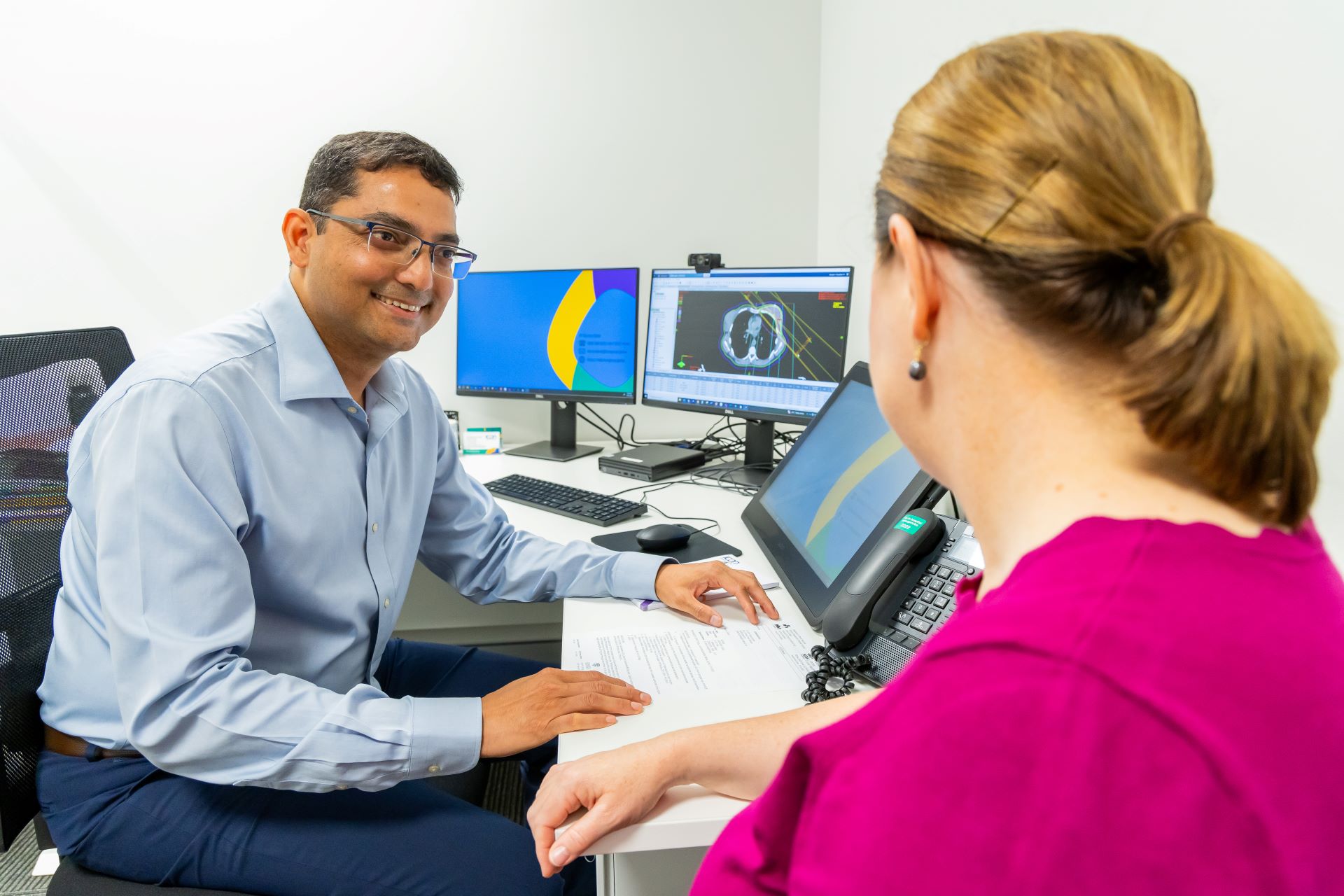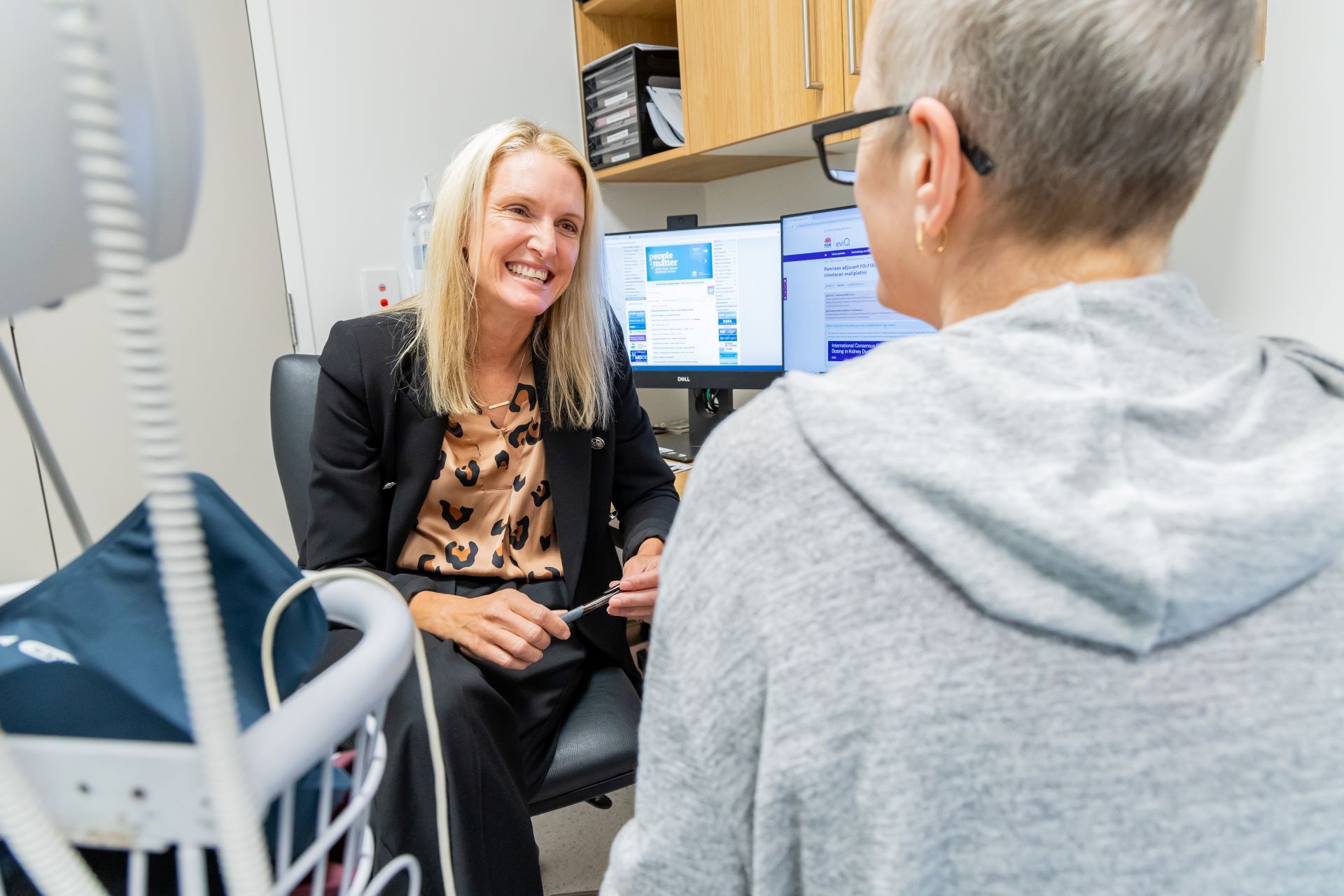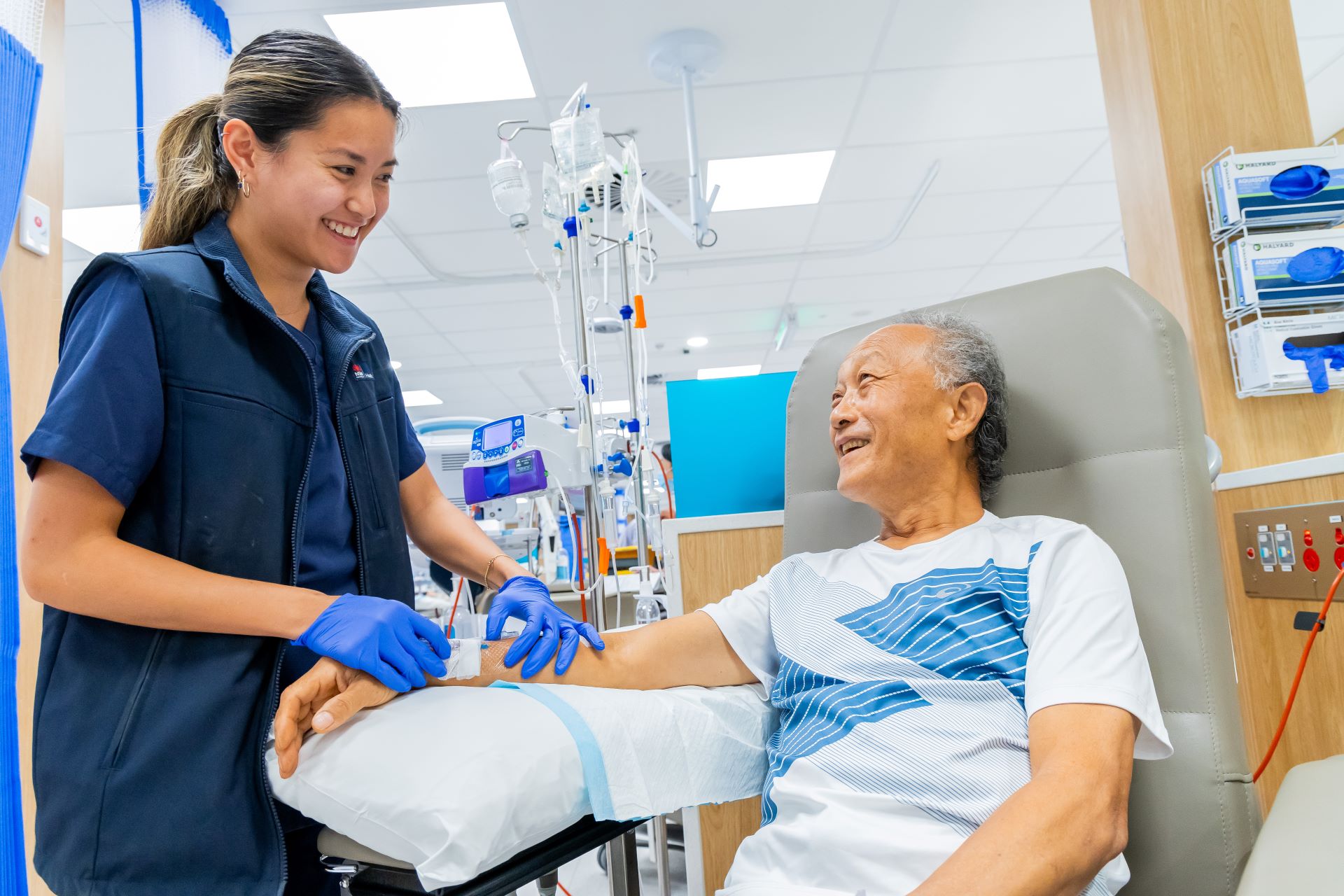
Treating Cancer
Cancer is a disease that impacts many peoples’ lives. According to the Cancer Institute NSW, on average, one in two people in NSW will be diagnosed with some type of cancer by the age of 85.
The experience of having cancer is different for everyone. There are over 100 known types of cancer which can start almost anywhere in the body and affect people in different ways.
After diagnosis
If you’ve received a cancer diagnosis it is normal to feel overwhelmed or worried. Everyone's experience with cancer is different. However, here is some helpful information from people who have been through a similar experience.
Information and questions
Reliable, factual information may help you process your experience. Our staff can direct you to resources that may help you navigate your diagnosis and treatment. For more information, please see the resources on our cancer information page. We recommend you speak with your doctor or health professional about your situation. Tell your doctor how much information you would like. Everyone is different when it comes to deciding on how much to know. You can change your mind at any time.
For help navigating the information available, a Cancer Council Liaison can also help you and carers access relevant, supportive, care information and services, in the right place, at the right time. You can call the Cancer Council NSW Information and Support Line on 13 11 20.
Your care
You can seek a second medical opinion. Don't be afraid to ask, your doctor will understand the need to put your mind at ease and it is part of your healthcare rights.
Write down questions in advance and keep a copy with you. You could also use this to write down other details like the date and reason for an appointment.
Speak up if you don't understand.
Take a family member or friend with you, if possible, when you see your doctor.
Before treatment
Before your treatment starts, your doctor will talk to you about your diagnosis, your options for treatment and the side effects of treatment so that you may give informed consent. You can change your mind at any time or ask for more information from members of your treatment team to make sure that you have made the best treatment decision for you.
Some people choose not have treatment and they can change their mind at any time. Deciding not to have treatment does not mean you will be on your own, there are other alternatives to control side effects if needed.
Make a help list - things that would be helpful to you or your family, for example, making a meal, or driving the kids to a hockey practice or swimming lesson. Then, when someone asks how they can help, you can look through your list. You, and the person offering to help, will both benefit.
Multidisciplinary teams
Multidisciplinary care is considered best practice in the treatment planning and care of all people with cancer. You can visit multidisciplinary team to learn more about who is involved, how teams work and why they are important.
Services
Our multidisciplinary teams are closely supported by our medical and allied health staff and our support services for patients, carers and families.
View cancer services (A-Z)
Types of cancer
Brain and spinal cancer
Brain and spinal cord cancers are cancers affecting the neurological system, which includes the brain, meninges (lining of the brain) and the spinal cord.

Cancer treatments for brain and spinal cancer may include:
- Surgery
- Radiotherapy
- Drug treatment, such as chemotherapy, immunotherapy or targeted therapy
- Supportive care, medication and allied health services including diet, exercise, mood or access to community services.
Our Brain and Spinal Cancer (Neurological) Multidisciplinary Team at Concord Cancer Centre meets weekly and includes specialists in neurosurgery, medical oncology, radiation oncology and neurology. Our specialists also work closely with our nurses and allied health staff to support the needs of each patient.
Your individual situation will be discussed by a multidisciplinary team to decide the best cancer treatment options for you.
Depending on the cancer treatment chosen, treatment may be offered at home, in our outpatient Day Therapy Centre, Radiotherapy Service or you might be admitted to hospital as an inpatient.
Health and Support Services
Additional services for patients may include Allied Health (including dietetics, physiotherapy, exercise physiology, social work and psychology), Concord Centre for Palliative Care, Pharmacy and Sydney Cancer Survivorship Centre. Support may include Aboriginal Cancer Care Coordinator, Cancer Council Liaison, CancerPlus - GP CanShare and Sydney Health Care Interpreter Service.
Clinical Trials
You may also be eligible to participate in a clinical trial through our Medical Oncology Clinical Trials Unit. Ask your treating team for more information or visit Cooperative Trials Group.
Blood cancers
Blood cancers include a wide variety of diseases which arise from blood cells. Blood cancers develop when blood cells aren’t made properly. The main types of blood cancers include acute and chronic leukaemia, Hodgkin and non-Hodgkin lymphoma, myeloma and myeloproliferative neoplasms.

Blood cancer treatments may include:
- Chemotherapy
- Immunotherapy with monoclonal antibodies
- Targeted therapies, usually tablets
- Radiotherapy
- Stem cell transplantation
- Supportive treatments including infusions and blood transfusion
- Involvement of our medical and allied health team to help with diet, exercise, mood or access to community services.
Our Blood Cancer (Haematological) Multidisciplinary Team at Concord Cancer Centre includes haematologists, radiation oncologists, radiologists, pathologists, nurses and clinical research staff. Our team meets weekly and works together to find the best way to diagnose and treat cancer and support the needs of each patient.
Your individual situation will be discussed by a multidisciplinary team to decide the best cancer treatment options for you.
Depending on the cancer treatment chosen, treatment may be offered at home, in our outpatient Day Therapy Centre or Apheresis and Cell Therapies Unit, Radiotherapy Service or you might be admitted to hospital as an inpatient.
Health and Support Services
Additional services for patients may include Allied Health (including dietetics, physiotherapy, exercise physiology, social work and psychology), Cancer Genetics, Concord Centre for Palliative Care, Pharmacy and Sydney Cancer Survivorship Centre. Support may include Aboriginal Cancer Care Coordinator, Cancer Council Liaison, CancerPlus - GP CanShare, Leukaemia Foundation and Sydney Health Care Interpreter Service.
Clinical Trials
You may also be eligible to participate in a clinical trial through our Haematology Clinical Research Unit. Ask your treating team for more information.
Cancer Information for Patients
The following organisations provide general information and support resources for blood cancer patients, their carers and families:
|
|
Clear, reliable information for people living with blood cancer and their family members, friends and health professionals. |
|---|---|
| Lymphoma Australia | Charitable organisation dedicated to providing free support for lymphoma patients. |
| MPN Alliance Australia |
Assists patients and carers to find information and support related to myeloproliferative neoplasms.
|
|
Myeloma Foundation of Australia
|
Myeloma specific organisation which provides up to date information and caring support to people who are living with myeloma, and their loved ones. |
| WMOzzies |
Support group for the Australian Waldenstrom’s Macroglobulinemia (WM) community.
|
Breast cancer
Breast cancer is cancer that forms in the cells lining the breast lobules or ducts. These cells grow uncontrollably and have the potential to spread to other parts of the body. There are different types and stages of breast cancer. Early stage breast cancer is confined to the breast and advanced stage breast cancer has spread to other areas of the body.
The type and stage of breast cancer you have been diagnosed with will help you and your doctors decide on the best treatment options for you.
Concord Cancer Centre provides the full range of diagnostic and treatment options, on site, for breast cancer including:
- Concord Breast Centre Surgical Service
- Radiotherapy
- Drug treatment, such as chemotherapy, immunotherapy, targeted therapy or hormone therapy in our outpatient Day Therapy Centre
- Medical, allied health teams and breast care nurses to help with diet, exercise, mood or access to community services.
Your individual situation will be discussed by a multidisciplinary team to decide the best cancer treatment options for you.
Our Breast Cancer Multidisciplinary Team meets weekly and includes specialists in breast surgery, medical oncology, radiation oncology, cancer genetics, pathology, nursing and other medical staff.
Health and Support Services
Additional services for patients may include Allied Health (including dietetics, physiotherapy, exercise physiology, social work, psychology and Lymphoedema Service), Breast Care Nurses, Cancer Genetics, Concord Centre for Palliative Care, Pharmacy and Sydney Cancer Survivorship Centre. Support may include Aboriginal Cancer Care Coordinator, Cancer Council Liaison, CancerPlus - GP CanShare and Sydney Health Care Interpreter Service.
Clinical Trials
You may also be eligible to participate in a clinical trial through our Medical Oncology Clinical Trials Unit. Ask your treating team for more information.
Gastrointestinal cancers
Gastrointestinal cancers are cancers affecting any part of the gastrointestinal tract, such as the oesophagus, stomach, pancreas, liver, gall bladder, bile ducts, small bowel, large bowel (including the rectum) and anus.

Cancer treatments for gastrointestinal cancer may include:
- Surgery
- Radiotherapy
- Drug treatment, such as chemotherapy, immunotherapy, targeted therapy or hormone therapy
- Supportive care, medication and allied health services including diet, exercise, mood or access to community services.
Our Multidisciplinary Teams at Concord Cancer Centre for gastrointestinal cancer include the Upper Gastrointestinal Cancer Multidisciplinary Team, Colorectal (Lower Gastrointestinal) Cancer Multidisciplinary Team and Liver Cancer Multidisciplinary Team. These teams include surgeons, medical and radiation oncologists, radiologists, pathologists, other doctors and nurses.
Your individual situation will be discussed by a multidisciplinary team to decide the best cancer treatment options for you.
Depending on the cancer treatment chosen, treatment may be offered at home, in our outpatient Day Therapy Centre, Radiotherapy Service or you might be admitted to hospital as an inpatient.
Health and Support Services
Additional services for patients may include Allied Health (including dietetics, physiotherapy, exercise physiology, social work and psychology), Cancer Genetics, Concord Centre for Palliative Care, Pharmacy and Sydney Cancer Survivorship Centre. Support may include Aboriginal Cancer Care Coordinator, Cancer Council Liaison, CancerPlus - GP CanShare and Sydney Health Care Interpreter Service.
Clinical Trials
You may also be eligible to participate in a clinical trial through our Medical Oncology Clinical Trials Unit. Ask your treating team for more information or visit Australasian GastroIntestinal Trials Group.
Lung cancer
Lung cancers are cancers affecting the respiratory system, which includes the lung and the lining of the lung. There are many types of lung cancer, such as non-small cell lung cancer, small cell lung cancer and mesothelioma.

Lung cancer treatments may include:
- Surgery
- Radiotherapy
- Drug treatment, such as chemotherapy, immunotherapy, targeted therapy or hormone therapy
- Supportive care, medication and allied health services including diet, exercise, mood or access to community services.
Our Lung Cancer Multidisciplinary Team at Concord Cancer Centre includes cardiothoracic surgeons, medical and radiation oncologists, respiratory physicians, other doctors and nurses. Our team meets weekly and work together to find the best way to diagnose and treat cancer and support the needs of each patient.
Your individual situation will be discussed by a multidisciplinary team to decide the best cancer treatment options for you.
Depending on the cancer treatment chosen, treatment may be offered at home, in our outpatient Day Therapy Centre, Radiotherapy Service or you might be admitted to hospital as an inpatient.
Health and Support Services
Additional services for patients may include Allied Health (including dietetics, physiotherapy, exercise physiology, social work and psychology), Concord Centre for Palliative Care, Pharmacy, and Sydney Cancer Survivorship Centre. Support may include Aboriginal Cancer Care Coordinator, Cancer Council Liaison, CancerPlus - GP CanShare, Sydney Health Care Interpreter Service and Asbestos and Dust Diseases Research Institute (ADDRI).
Clinical Trials
You may also be eligible to participate in a clinical trial through our Medical Oncology Clinical Trials Unit. Ask your treating team for more information or visit Thoracic Oncology Group Australasia.
Prostate cancer
Prostate cancers affect the prostate gland in men and are one of many types of genitourinary cancers.

Cancer treatments for prostate cancer may include:
- Surgery
- Radiotherapy
- Drug treatment, such as chemotherapy, targeted therapy or hormone therapy
- Supportive care, medication and allied health services including diet, exercise, mood or access to community services.
Our Prostate Cancer Multidisciplinary Team at Concord Cancer Centre includes surgeons, medical and radiation oncologists, other doctors and nurses. Our team meets weekly and work together to find the best way to diagnose and treat cancer and support the needs of each patient.
Your individual situation will be discussed by a multidisciplinary team to decide the best cancer treatment options for you.
Depending on the cancer treatment chosen, treatment may be offered at home, in our outpatient Day Therapy Centre, Radiotherapy Service or you might be admitted to hospital as an inpatient.
Health and Support Services
Additional services for patients may include Allied Health (including dietetics, physiotherapy, exercise physiology, social work and psychology), Concord Centre for Palliative Care, Pharmacy and Sydney Cancer Survivorship Centre. Support may include Aboriginal Cancer Care Coordinator, Cancer Council Liaison, CancerPlus - GP CanShare and Sydney Health Care Interpreter Service and Mesothelioma and Silicosis diseases support from Asbestos and Dust Diseases Research Institute (AADRI).
Clinical Trials
You may also be eligible to participate in a clinical trial through our Medical Oncology Clinical Trials Unit. Ask your treating team for more information or visit Australian and New Zealand Cancer Trials Group.